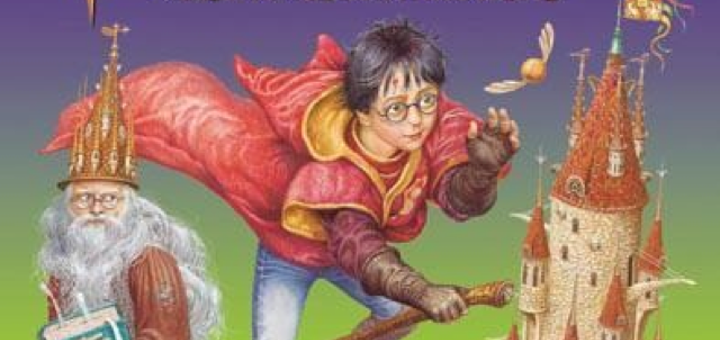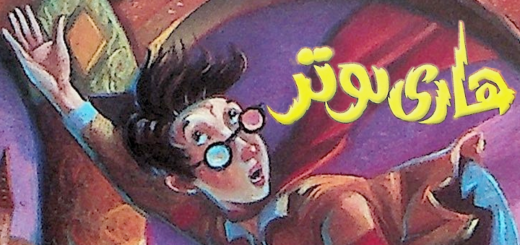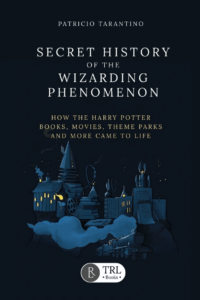 Harry Potter and the Ukrainian Orphanage
Harry Potter and the Ukrainian Orphanage
There’s an oft-repeated claim that in the Ukrainian translation of Harry Potter, Hogwarts is an orphanage, not a school. Presumably this is because there’s no cultural background for Ukrainians to understand the concept of “boarding school” and that was the closest approximation to convey the environment.
That poses some pretty incredible difficulties for the story—for a translator wouldn’t it be more difficult to explain why kids at an orphanage are returning home to their parents for the summer than the concept of a boarding school? The idea was pretty roundly dismissed on Reddit where some sources were kindly cited, notably a post on the-leaky-cauldron.org which quotes—and here I did a double-take—Nicholas Žekulin, a professor at the University of Calgary. I know him!
The University of Calgary is my alma mater—I did my undergrad degree in Linguistics there. I didn’t meet Dr. Žekulin at that time though; I met him in 2010 when I saw an article about his collection of Harry Potter translations going on display at the university. He was a professor in the (then) Department of Germanic, Slavic and East Asian Studies—now he’s a Professor Emeritus (i.e. retired)—and the first translator collector I met other than myself. His specialty is Russian literature which is admittedly not Ukrainian—I don’t know how fluent in Ukrainian he is—but they are very closely related languages and it seems not to be a claim that someone of his stature would make without reason. Perhaps it’s worth digging into?
It appears that the original quote came from an article “Harry Potter goes Online — in 70 languages” by Meghan Potkins, Post Media News on 2011-11-24. The article is about a project many of us might be familiar with: “Celebrating Multilingualism through Harry Potter” which included putting up readings by native speakers of all the languages in Dr. Žekulin’s collection. (I, myself, recorded the Latvian native speaker for the project.) Sadly, the project is no longer online1.
Dr. Žekulin is quoted in the Post Media article as saying:
“The Ukrainian translation is interesting. They don’t have (Hogwarts) school, they have an orphanage. And the reason is that in Ukrainian culture, the idea of a boarding school is completely unknown. The only thing they could conceive of as bringing children together was an orphanage.”
I reached out to Dr. Žekulin, and I’m delighted to say that he responded. He does remember the claim about Hogwarts being an orphanage, but says, “if it is attributed to me, then it could not have been on the basis of my own knowledge.” He thinks it’s possible that it came from one of the speakers at the mini-conference that was held in conjunction with the initial exhibition of his collection at the University of Calgary (keep in mind, this is more than a decade ago now!). Unfortunately, that doesn’t really provide much evidence for or against the claim; the source is still potentially enough of an expert on translation and Ukrainian to have been invited to speak on the subject. However, I do concede this is starting to seem like a game of “telephone”.
Is it too obvious to suggest looking at what the actual text says?
| Гоґвортська Школа Чарів і Чаклунства |
| Hogvortsʹka Shkola Chariv i Chaklunstva |
| Hogwarts School of Magic and Witchcraft |
I don’t think there’s much confusion in the name—школа (shkola) translates as ‘school’ and not only that, it’s unambiguously the same cognate that essentially all the European languages share which was borrowed from the Latin schola (Schola Hogvartensis Artium Magicarum Et Fascinationis is the school’s full name in the Latin translation incidentally).
I also found an article interviewing the translator, Viktor Morozov where he discusses challenges in translating the books. He makes no mention of the “boarding school” problem and given its potential prominence, you’d think it might have come up had he transformed Hogwarts into an orphanage. Not conclusive evidence, to be sure, but not inconsequential.
So, there is very little in support of the “Hogwarts orphanage” theory. That said, the most emphatic counter evidence—the Reddit commentary—doesn’t seem to hold a lot of water either. It’s claimed that that the Ukrainian translation uses the word интернат, (internat) which means ‘boarding school’ but I can’t find that word anywhere in any of the Ukrainian texts. Like Dr. Žekulin’s statement, I have no reason to believe that it is an outright lie; there’s likely some other explanation… maybe internat was used in the Ukrainian movies? The word is the same in Russian; maybe they read both and remembered it from the Russian? (I did do a quick search through both Russian translations of the first book and couldn’t find it there either.) Or it could just be that the commenter knows that Hogwarts is a boarding school and their memory filled the word in—our memories are funny like that.
I don’t like loose strings, so I asked u/SeerPumpkin, the redditor who said internat was used in the books. I’m grateful to say they got back to me right away—and they didn’t remember saying it. (It was a couple of years ago.) We determined that it is likely they simply repeated something that had been said by a native Ukrainian speaker in another reddit thread; and although ambiguous, it seems that speaker was not claiming the word was used in the book but rather using it to counter the idea that the concept of a boarding school is alien to Ukrainians.
Another dead end with internat; the lack of evidence in either direction is incredibly frustrating when conducting an investiagtion! We know that “school” is used in the books and that is compelling; however, not being a native speaker, I’d still like something more to feel comfortable saying the claim is completely unfounded. What about the use of “orphanage”? We know that an orphanage is central to Tom Riddle’s origin story and so it must appear in the books—do the same words also show up in reference to Hogwarts?
Here you need to be a bit careful being a native English speaker doing analysis in a language you don’t know. The obvious procedure would be to pop over to Google Translate, look up “orphanage” and search for it in the texts2. And you’d get nowhere for several reasons.
- Text Encoding: The days before Unicode were dark days indeed. And sadly, they linger, complicating our multilingual (multiscriptual?) lives3. It’s not even always easy to tell when texts are not using the same encoding—computers try really hard to make any text legible for users without making them worry about encodings.
- Inflection: Ukrainian, being a Slavic language, has lots of inflection and agreement which means that the verbatim dictionary form of any word you look up may not appear in the text at all, even as a substring.
- Unintended Usage: Google Translate has a specific purpose—quick and dirty translation that will give a native speaker of the target language a decent overview of what a passage of text means. It starts to break down very quickly as soon as you start using it outside of that intended usage: in this case, translating a single word in English into a language you don’t know. You’ll get an answer—possibly not a useful one. Don’t get me wrong—Google Translate is awesome—but you do need to know what it’s limitations are and work around them.
Google Translate gave me дитячий будинок (dytyachyy budynok) which is literally ‘baby house’. Plausible for sure—but even accounting for inflection, it appears nowhere in the Ukrainian translations. That’s not what we expect since we know that orphanages come up! So there’s got to be another word. Maybe ‘orphan’ will give us some clues? Google Translate coughs up сирота (syrota)—and there are a couple of hits searching for that word! But only two in 7 books? That’s still less than we’re expecting—damn inflection! Ukrainian inflection is primarily at the end of the word so I started trimming the end of the word searching for a (potential) stem: сирот– (syrot-). Jackpot!
Twiddling my searches and examining the associated text, I found a few words and phrases that unambiguously mean “orphanage(s)”:
| сиротинці | syrotyntsi | ‘orphanages’ |
| сиротинець | syrotynetsʹ | ‘orphanage’ |
| сиротинця | syrotyntsya | ‘orphanage’ |
| притулку для сиріт | prytulku dlya syrit | ‘shelter for orphans’ |
The variation in the first three is due to inflection and the last is a synonym. The first inflected form I believe is a plural; the others, I don’t know and for my purposes here, I don’t really care4: I just want to know what context these are being used in and who or what they are referring to. In every case, ‘orphan’ is referring to Harry or Tom Riddle and ‘orphanage’ is referring to where Tom Riddle grew up or where Harry might have grown up. It never refers to Hogwarts. Is it still possible that there’s another word for orphanage used exclusively in reference to Hogwarts? Yes, technically, but it’s starting to be really unlikely.
I’m convinced to my satisfaction of several things at this point:
- Ukrainian culture has no problem with the concept of a boarding school.
- Hogwarts has not been transformed into an orphanage in the Ukrainian translation.
- You can’t always trust what you read on the internet.
- Fact checking can be complicated—particularly when you are doing it in a language you don’t know! But it is possible with modern tools when you aren’t intimidated by them!
There is still a mystery as to where the original claim originated—I have to believe that there was some reason that was taken out of context, exaggerated, misremembered or otherwise misinterpreted. Was it something a native speaker said? Was it a more nuanced analysis of the cultural setting of Hogwarts? (Much has been made of how poorly the unique culture of British boarding schools translates around the world.) Was someone misquoted? Did someone misremember “Ukrainian” and was thinking of another translation entirely—is there a Hogwarts Orphanage hiding in another translation and we’ve never taken note? I would be much more satisfied with this conclusion if I had an explanation—some insight into the misapprehension here. Nonetheless, I think we can consider this myth busted!
Acknowledgements:
Thanks to Dr. Nicholas Žekulin and Redditor u/SeerPumpkin for providing their insight!
Notes:
1All the Pretty Books has a similar project called “Harry Potter, The Book That Lives” that readers should definitely explore!
2You probably have by now correctly inferred that I have the full text of these books. I decline to discuss the matter further. ?
3Once upon a time, there were only 128 (27) characters on computers. Every letter, symbol, key… is mapped to a number—a “code point”. Underlying, all digital text is just one long number (this in itself is a profound thought—the set of infinite numbers contains every book written by a human!). A font is a map between those code points and images (glyphs) that are something that we recognize. The 128 standard character set was called ASCII and it was barely enough to encode English text (computer science is a very anglocentric field). Speakers of other languages wanted to be able to write their languages too! But computers were not very powerful yet, so they they only expanded the code point range by one more power of two: 256 (28)—and things got wild for anyone who wanted to work in more than one language at a time. Different “code pages” were defined: Microsoft’s were probably the most widely recognizable unsurprisingly, but there were many and there were not all compatible. WINDOWS-1252, “Latin 1 / Western European” was the default for English Windows; WINDOWS-1251, “Cyrillic” was used for cyrillic text in any language. The important fact is that each code page had to use the same 256 numbers to represent text. To change language, you had to change the font. But fundamentally, there was no way for the computer to know what language the text was in or what font to use—in the early days of the internet, web-browsers had menu items to manually switch the code page of the website you were viewing so the text would display properly. In some cases, you’d have to manually download and install a specific font from a website in order to display the text properly—lots of languages didn’t even have code pages or weren’t supported by Microsoft so enterprising individuals eager to get their language online went ahead and just made their own.
Then came Unicode and everyone saw that it was good. But habits are hard to change and while Unicode is the standard everywhere, code pages and custom fonts continue to abound, particularly in text intended for lower-end devices.
4I’m a linguist, of course I care—my point is that you can draw conclusions even without all the minute details!





